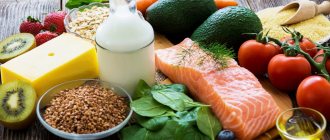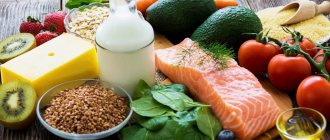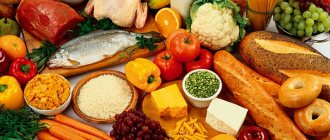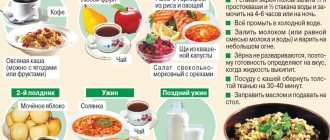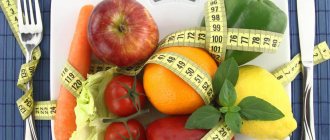Amount of food
Now you have to eat for two, otherwise there won’t be enough milk... Sounds familiar, doesn’t it? Guided by the best intentions and their experience of motherhood, our mothers and grandmothers simply insist on abundant nutrition for the nursing mother. Does breast milk production really depend directly on the amount of food a woman consumes?
To date, a huge number of studies have been conducted that clearly indicate that the amount of milk is in no way related to the amount of food consumed by a nursing mother. All the “excess” eaten will be carefully deposited by the mother’s body on the sides (and not only) of the woman herself.
According to data obtained during research, a baby, regardless of age, “consumes” no more than 300-500 Kcal per day. To take this into account in the mother’s diet, you can introduce an extra snack, for example, a second light breakfast or afternoon snack. The main thing is to observe moderation and remember that after childbirth, the female body goes through a complex recovery process, including hormonal balance, and excess weight that appears due to poor nutrition can create serious additional stress and problems.
Yes or no?
The most questions and disputes are caused by the list of products that are allowed or prohibited, and categorically, for women who practice breastfeeding. The paradox of the situation is that the nutrition of a nursing mother should be as complete as possible (from the point of view of high-quality nutrition for the child), however, there is an opinion that some foods should be excluded, as this can negatively affect the well-being and health of the baby. What should I do?
To answer this question, it is necessary to clearly understand how breast milk is synthesized. If we get away from specialized medical terms as much as possible, then the process can be defined as follows:
- food enters the gastrointestinal tract and the digestion process begins;
- all the necessary nutrients enter the woman’s blood through the intestinal walls;
- With the flow of blood and lymph, these substances enter the area of the mammary gland, which synthesizes breast milk.
That is, all fermentation products, as well as allergens, remain “in the intestines” of the mother. However, if a woman's reaction to the foods she eats is so strong that it affects the composition of her blood, breast milk, or rather its composition, may also change.
To ensure that a nursing mother’s nutrition is complete and that the baby is healthy and cheerful, it is necessary to remember three important rules:
- The nutrition of a woman who is breastfeeding should include the most complete list of products, the composition of which covers her nutritional needs for vitamins and microelements (minerals, biologically active substances, etc.).
- Any “new” products or products that can cause a violent response from the female body (gas formation or an allergic reaction) must be introduced gradually - one product per day. After this, take a break (1-2 days), make sure that there is no negative reaction, after which you can introduce the next one.
- Regardless of the product category, you need to be as prudent as possible and pay special attention to the quantity of products consumed. The “Rule of Reasonability” says that any food can be introduced into food, but in reasonable quantities. Of course, in this case, we are not talking about alcohol or food that can affect the taste of breast milk (which, according to some experts, can cause the baby to refuse the breast).
Moreover, we can say with confidence that the child, while in the womb, has already experienced the effects of almost all nutrients, including allergens. If they continue to come in small quantities through mother's milk, then, most likely, the introduction of complementary foods will take place without any surprises. The child’s body has already learned to cope with them in small doses.
Photo source: shutterstock.com
How can a nursing mother preserve milk on a diet if her child has food allergies?
Food allergies while breastfeeding force you to change your diet. How to preserve the milk of a nursing mother on a diet and how to eat properly so that the child does not have discomfort and deficiency of vitamins and microelements, says general practitioner and allergist Tatyana Nikolaevna Dzyaduk.
— Tatyana Nikolaevna, please tell us how the diet of a nursing mother affects the composition and production of breast milk.
— The mother’s body’s ability to produce breast milk is resistant to external factors, including the volume and composition of nutrition. It is evolutionary that no matter what foods the mother consumes, breast milk is secreted in sufficient quantities and with a constant composition. Proteins, carbohydrates, fats and most microelements, even if the diet is not rich in them, will be in abundance in breast milk, because they will come, if necessary, from the reserves of the mother’s body.
— What type of diet is best to consider if you are allergic to breastfeeding? What foods should you exclude?
— There is no concept of “nursing mother’s diet.” In modern realities, most testimony is false. The doctor prescribes a diet for the mother only if an allergy is proven, and only with the exclusion of a specific allergen and products that include it. But this is not half the diet and certainly not the majority of it.
The effectiveness of different dietary restrictions
| Rotation diet for a nursing mother | Universal hypoallergenic diet for nursing mothers | Preventive nutrition during pregnancy and breastfeeding | |
| Principle | The composition of the products changes completely after a certain period of time, for example, every four days. | The most common food allergens and pseudoallergens are excluded. | The consumption of certain types of foods is limited. |
| Result | Does not work, since there is no concept of cumulative allergy. Manifestations of allergies do not depend on the amount of allergen eaten: symptoms appear immediately after consuming the product. | Ineffective tactics since a large number of foods are excluded, which causes nutritional deficiency and psychological discomfort, and after the child improves, it is difficult to determine which product it is associated with and what can be reintroduced. Increases the risk of future food allergies. | Does not reduce the risk of allergies, Moreover, the opposite has been proven, that is, an increase in the likelihood of allergic reactions. This is especially true for highly allergenic foods from the “big eight” food allergens. |
| Principle | ||
| Rotation diet for a nursing mother The composition of the products changes completely after a certain period of time, for example, every four days. | Universal hypoallergenic diet for nursing mothers The most common food allergens and pseudoallergens are excluded. | Preventive nutrition during pregnancy and breastfeeding The consumption of certain types of foods is limited. |
| Result | ||
| The nursing mother's rotation diet does not work because there is no concept of cumulative allergies. Manifestations of allergies do not depend on the amount of allergen eaten: symptoms appear immediately after consuming the product. | Universal hypoallergenic diet for nursing mothers An ineffective tactic, since a large number of foods are excluded, which causes nutritional deficiency and psychological discomfort, and after the child improves, it is difficult to determine which product it is associated with and what can be reintroduced. Increases the risk of future food allergies. | Preventive nutrition during pregnancy and breastfeeding does not reduce the risk of allergies; moreover, the opposite has been proven, that is, an increase in the likelihood of allergic reactions. This is especially true for highly allergenic foods from the “big eight” food allergens. |
Neither Russian nor foreign associations of allergists distinguish special types of diets during breastfeeding. A mother’s diet for a proven food allergy in a baby involves removing from the diet only the allergen, the product to which the reaction occurs.
Mandatory product categories for breastfeeding:
- bread and other baked goods, pasta, cereals;
- meat fish;
- fruits vegetables;
- milk products;
- butter - butter and vegetable.
You cannot completely exclude an entire group of products, for example, baked goods or meat, fish and all sources of protein, including plant-based. With total exclusion, vitamin B12 deficiency will most likely develop and problems with iron will arise.
If a child is allergic and one product is removed from a certain group, it is replaced with another. Difficulties are possible with dairy foods, because they are completely excluded in case of severe allergy to cow's milk protein. In this situation, together with the doctor, supplements or medications are selected that compensate for the existing deficiency of microelements, for example, calcium.
If a child reacts to several foods, we work together with an allergist and nutritionist to choose a gentle diet and give the mother the opportunity to eat properly, feel comfortable, not go hungry and not worry about it.
— What products does a dairy-free diet for nursing mothers start with?
— The exclusion of dairy products is carried out for the purposes of diagnosis and treatment.
| Dairy product ladder:
|
— Mom is watching the dynamics. Under the supervision of a doctor, over time it is possible to reintroduce foods to which there is no reaction into the diet.
— How long will you have to follow the diet?
— The duration of the diet depends on the type of food allergy and the severity of the baby’s symptoms, and the more severe his condition, the longer the restrictions.
| Average duration of diet |
|
| When to return to mom's usual food |
|
— Is it only the mother’s diet that causes infant allergies?
— Food allergies in a baby can appear after supplementary feeding with a mixture of cow's milk and complementary foods. In this case, there must be a direct connection with the product for each use. It doesn’t happen that one time a rash appears on a baby’s cheeks, and another time the skin remains clear.
Allergies not related to food also occur. For example, a contact allergy in a baby develops to household chemicals, powder, and skin cleansers. And the triggers that worsen the condition of the skin in atopic dermatitis are sweat, dry air, chemical and physical irritants.
— Mothers are worried that on a diet, breast milk becomes “empty” and its quantity decreases significantly. How to preserve breast milk?
— Breast milk cannot become empty. The amount of milk fats, proteins, and carbohydrates depends on the type. So, a cow’s milk has a fat content of 4.5%, a seal’s milk has 53%, and a woman’s milk has 4.38%. And this is a constant value that does not depend on nutrition and diets (but depends on the age of the child). However, during severe fasting, when, for example, turkey and buckwheat remain in the diet, a slight decrease in the volume of milk and a change in its composition may occur. Neither mother nor child need such a diet - that is why nutritional adjustments are always carried out by a doctor.
The volume of mother's milk depends on the following factors:
- incomplete emptying of the breast;
- stressful state;
- active smoking;
- use of pacifiers;
- supplementary feeding with mixture.
The amount of milk is determined by the baby's need. This is proven by the fact that a mother can feed twins or triplets. Sucking stimulates milk production. But if you start giving supplementary feeding, breast stimulation decreases and the body decides that there is no longer a need to produce milk, so lactation fades away.
— What signs indicate a lack of nutrients during breastfeeding? What can be recommended to cover the deficiency and improve lactation?
— Symptoms of a deficiency of vitamins and microelements in the mother will be constant drowsiness, fatigue, increased hair loss, brittle nails, dry skin, general poor health, and malaise. All signs are comprehensively assessed by a doctor.
Based on complaints and the results of medical tests, a deficiency of certain minerals is determined and a drug is prescribed that replenishes this deficiency, with further monitoring of the effectiveness of treatment.
Definitely no
Modern researchers confirm the connection between a mother's diet and the quality of breast milk. This means that we can safely say that a nursing mother’s diet should consist of foods that are healthy for her! On the contrary, you should avoid, or even completely abandon, the consumption of foods that:
- increase the load on the gastrointestinal tract, liver, pancreas, and also increase the likelihood of excess weight (this can be fatty, fried and “heavy” foods, canned foods);
- have a negative (currently) effect on a woman’s central nervous system (disinhibiting effect), for example, strong tea (black, green) and coffee;
- contain preservatives, dyes and stabilizers that can affect the hormonal system of a nursing woman, at a time when she is in the process of recovering from childbirth and is most vulnerable.
What should you eat?
Meat or fish - every day. Fermented milk products, cottage cheese, mild cheeses, vegetables and fruits, as well as cereals are very healthy and necessary in the diet of a nursing mother. The list of permitted and recommended products
includes eggs, butter and vegetable oil, juices and nectars, bread and pasta.
80-90 g of fat
per day , so you should not rely on low-fat foods. To monitor the balance of nutrients in your diet, you can use the food diary, which is available after registering on our website.

